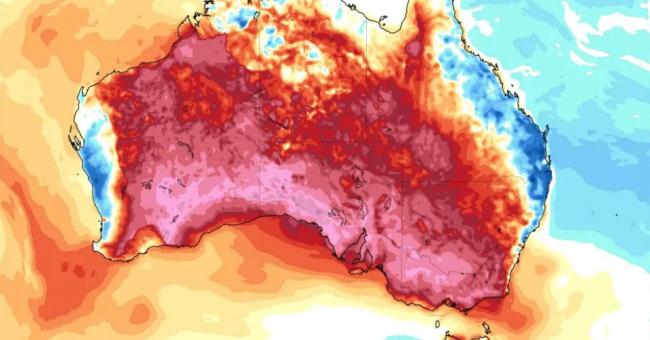Articles Menu

December 19, 2019
[Editor: see videos in tweets below at link here.]
Calls for immediate and ambitious action to tackle the climate emergency piled up Thursday in response to preliminary analysis from Australia's Bureau of Meteorology that Wednesday smashed the nation's temperature record by a full 1°C just one day after the previous all-time record.
The first record was set Tuesday, when Australia's national average maximum temperature reached 40.9°C (105.6°F), eliciting alarm from climate and fire safety experts. Wednesday, the average rose to 41.9°C (107.4°F), sparking a fresh wave of warnings and demands for bold efforts to battle the planetary crisis.
For the second day in a row, Australia has broken its hottest day in recorded history.
The nationwide average temperature on December 18 was 41.9°C (107.4°F) -- across an area the size of the U.S. -- that's unthinkable.
We are in a climate emergency. https://twitter.com/BOM_au/status/1207539156483792897 …
"On Wednesday, Australia's heatwave reached incredible proportions," tweeted Kees van der Leun, a director at the American consultancy firm Navigant who works with energy sector clients in Europe and the Middle East.
"I think this is the single loudest alarm bell I've ever heard on global heating," added van der Leun. "Red lights flashing all over. Politicians not taking this as a call for climate action will probably never act at all."
“The reality of climate change is upon us.”
Australia records its hottest day on record, two days in a row.
Amid the mounting alarm, meteorologists warned Thursday that the record-smashing heat in Australia is set to continue. The Sydney Morning Herald reported that "the national temperature record could be broken for the third day in a row when it is analyzed on Friday."
New South Wales—which is Australia's most populous state and home to Sydney, the country's largest city—has been battling high temperatures and devastating bushfires for the past few months.
"While other parts of the country will cool down, NSW is bracing for deteriorating conditions on the weekend," according to the Herald. Saturday, the temperature could soar to 47°C (116.6°F) in Western Sydney.
Alongside higher temperatures in the coming days, Neil Bennett of the government's meteorology bureau told the newspaper, "the other thing that's similar to today is that there will be a southerly change during the day. So once again the fires will be impacted, and that's just going to exacerbate problems."
In response to over 100 wildfires raging across NSW—only half of which are under control—the state government on Thursday declared a seven-day state of emergency and announced a statewide total fire ban that will run through midnight Saturday.

#UPDATE A state of emergency was declared in Australia's most populated state of New South Wales on Thursday as an unprecedented heatwave fanned out-of-control bushfires, destroying homes and smothering huge areas with a toxic smoke http://u.afp.com/JFmZ #NSWbushfires
VIDEO: A state of emergency was declared in Australia's most populated state of New South Wales on Thursday, as a record heatwave fanned unprecedented bushfires #NSWbushfires
According to The Associated Press:
New South Wales Premier Gladys Berejiklian said authorities were concerned with the unpredictable conditions.
"With extreme wind conditions, extreme hot temperatures, we have a good idea, a good sense, of where the most concerning areas are, but again when you've got those turbulent conditions, embers and spot fires can occur very unpredictably," she told reporters.
In addition to NSW, bushfires are also burning in the states of Queensland, South Australia, and Western Australia. The AP noted that "protesters on Thursday camped outside Prime Minister Scott Morrison's Sydney residence demanding urgent action on climate change."
Local climate advocacy groups shared updates from the scene:
Bunking in at the PM's house to wait for @ScottMorrisonMP to come back and do his job and tackle the #climatecrisis. We're outside 109 Kirribilli Ave if you wanna join. #WhereTheBloodyHellAreYou #FireMorrison
Izzy was moved on by a mob of riot police at @StrikeClimate’s camp out outside Prime Minister Scott Morrison's Kirribilli House. Sydney is choking, NSW is burning, & our PM is nowhere to be found.#FireMorrison #Auspol #FireScomo #WhereTheBloodyHellAreYa #ThisIsClimateChange
Residents impacted by the blazes and leftist politicians have sharply criticized how Australia's Liberal-National Coalition government, led by Morrison, has handled the recent fires—and, more broadly, the global climate crisis.
Anthony Albanese, leader of Australia's Labour Party, addressed the need to step up federal government action in comments to reporters Thursday:
"These bushfires are not business as usual...firefighters are exhausted, we need to provide them with the same level of support that they're providing their community." @AlboMP has addressed the bushfire crisis as flames continue to burn in NSW. https://7news.link/OyAU59 #7NEWS
"The government needs to open their eyes and see through the smoke," Albanese tweeted, sharing a short clip of his remarks. "Bushfires are threatening homes and communities. This is a national crisis. We need a national response."
[Top image: A map shows the high temperatures in Australia on Dec. 18, 2019. (Image: Tropical Tidbits)]